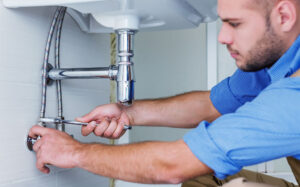Are Plumbers Trained to Work With the Latest Plumbing Technologies?
Plumbers Trained to Work With the Latest Plumbing Technologies
Plumbers are responsible for the installation, maintenance and repair of pipes that carry water, steam and other natural elements. This can include the lines that supply water to homes and businesses, as well as those that remove waste from toilets, sinks, tubs, showers, dishwashers and other appliances. Plumbers also work on sewage systems and septic tanks. Plumbers must be familiar with a wide range of tools and techniques including pipe cutting, welding torches, drain cleaning, pressure testing and more. They are also required to understand a variety of other plumbing technologies, some of which have been designed specifically to improve the health and safety of people using the plumbing system in their home or business.
For example, smart filtration systems that can detect bacteria and other contaminants are becoming increasingly popular in homes, as are touchless toilets and LED lights to help illuminate dark bathrooms. Other new technology includes tankless water heaters that can save money and energy by reducing the amount of time that water is heated, as well as smart leak detectors that alert homeowners to issues before they become more serious. Many of these products are also designed to be easily integrated with other plumbing fixtures, such as showerheads that can be controlled via Amazon Alexa.
Licensed plumbers also have years of hands-on experience, which helps them to troubleshoot a variety of plumbing problems quickly and effectively. They know how to properly install, maintain and repair plumbing fixtures and systems, and are aware of the latest industry trends and best practices. This means that you can trust a licensed plumber near me to provide you with the highest quality service possible.

Are Plumbers Trained to Work With the Latest Plumbing Technologies?
In addition, many licensed plumbers have access to a range of plumbing technology tools that make their job easier and more efficient. For example, specialized remote cameras can help plumbers locate leaks and other problems without tearing down walls. Other useful tools include crimping tools, magnetic locators to find pipes, cross line lasers and moisture meters. GPS fleet tracking software is also being used more and more by plumbing companies to monitor and record driver behaviors such as speeding and hard braking, as well as track vehicle location and optimize routes for maximum efficiency.
Nonweather water damage is an ongoing concern for plumbers, as it can account for up to one-third of insurance claim costs and can lead to major structural repairs and replacement. In response, plumbers are taking proactive steps to mitigate the risk of water damage by installing and maintaining waterproofing systems in their customers’ homes and businesses.
Ranken’s nine-month Certificate in Plumbing Technology program provides students with the hands-on training and skills needed to work on residential plumbing jobs. This highly-respected program is offered at the brand-new Hugh L. Libby Career and Technical Education Center, giving students the opportunity to practice their skills in state-of-the-art facilities. To learn more about this exciting and rewarding career path, contact us today!
Local knowledge is another critical factor when searching for a plumber for new construction. A plumber familiar with the local terrain, weather conditions, and plumbing infrastructure can anticipate challenges and tailor solutions accordingly. This local expertise is particularly valuable in ensuring the durability and resilience of the plumbing systems against region-specific factors.